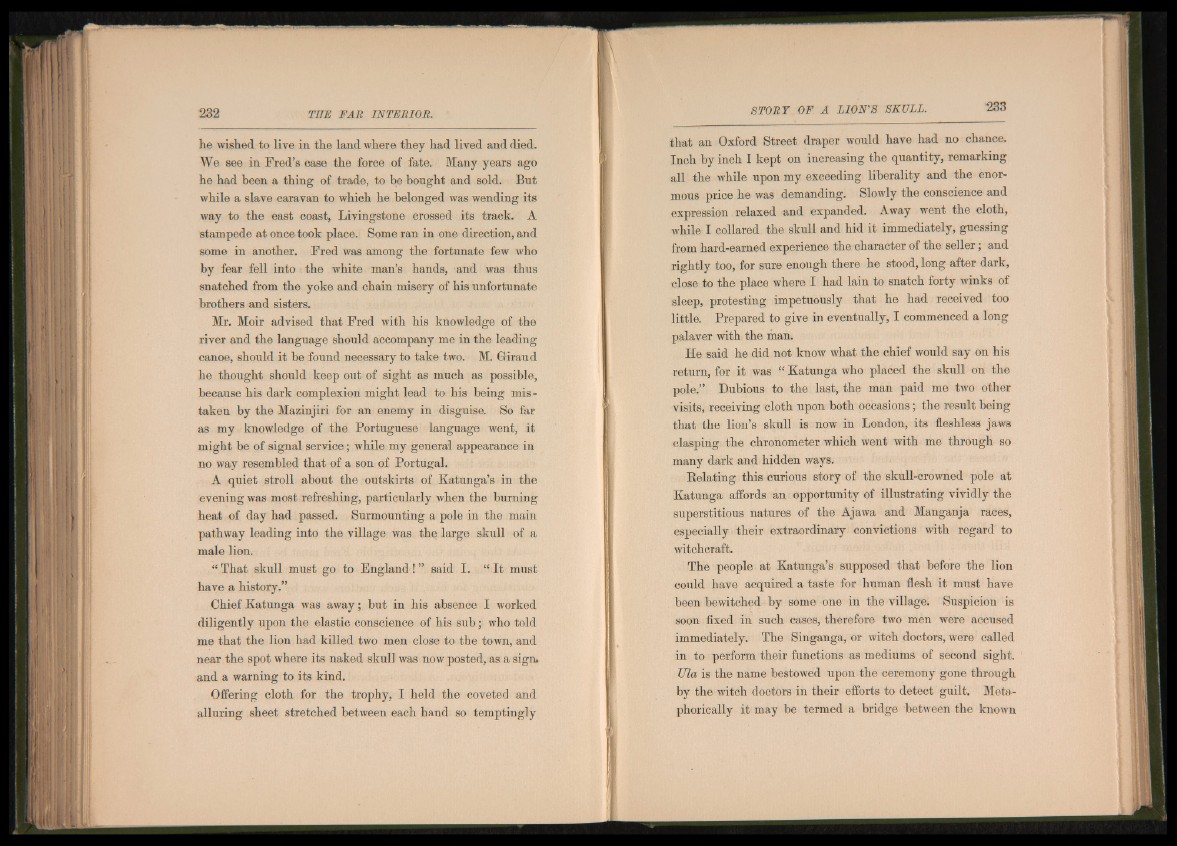
he wished to live in the land where they had lived and died.
We see in Fred’s case the force of fate. Many years ago
he had been a thing of trade, to be bought and sold. But
while a slave caravan to which he belonged was wending its
way to the east coast, Livingstone crossed its track. A
stampede at once took place. Some ran in one direction, and
some in another. Fred was among the fortunate few who
by fear fell into the white man’s hands, and was thus
snatched from the yoke and chain misery of his unfortunate
brothers and sisters.
Mr. Moir advised that Fred with his knowledge of the
river and the language should accompany me in the leading
canoe, should it be found necessary to take two. M. Giraud
he thought should keep out of sight as much as possible,
because his dark complexion might lead to his being mistaken
by the Mazinjiri for an enemy in disguise. So far
as my knowledge of the Portuguese language went, it
might be of signal service; while my general appearance in
no way resembled that of a son of Portugal.
A quiet stroll about the outskirts of Katunga’s in the
evening was most refreshing, particularly when the burning
heat of day had passed. Surmounting a pole in the main
pathway leading into the village was the large skull of a
male lion.
“ That skull must go to England ! ” said I. “ I t must
have a history.”
Chief Katunga was away; but in his absence I worked
diligently upon the elastic conscience of his sub; who told
me that the lion had killed two men close to the town, and
near the spot where its naked skull was now posted, as a sign,
and a warning to its kind.
Offering cloth for the trophy, I held the coveted and
alluring sheet stretched between each hand so temptingly
that an Oxford Street draper would have had no chance.
Inch by inch I kept on increasing the quantity, remarking
all the while upon my exceeding liberality and the enormous
price he was demanding. Slowly the conscience and
expression relaxed and expanded. Away went the cloth,
while I collared the skull and hid it immediately, guessing
from hard-earned experience the character of the seller; and
rightly too, for sure enough there he stood, long after dark,
close to the place where I had lain to snatch forty winks of
sleep, protesting impetuously that he had received too
little. Prepared to give in eventually, I commenced a long
palaver with the man.
He said he did not know what the chief would say on his
return, for it was “ Katunga who placed the skull on the
pole.” Dubious to the last, the man paid me two other
visits, receiving cloth upon both occasions; the result being
that the lion’s skull is now in London, its fleshless jaws
clasping the chronometer which went with me through so
many dark and hidden ways.
Relating this curious story of the skull-crowned pole at
Katunga affords an opportunity of illustrating vividly the
superstitious natures of the Ajawa and Manganja races,
especially their extraordinary convictions with regard to
witchcraft.
The people at Katunga’s supposed that before the lion
could have acquired a taste for human flesh it must have
been bewitched by some one in the village. Suspicion is
soon fixed in such cases, therefore two men were accused
immediately. The Singanga, or witch doctors, were called
in to perform their functions as mediums of second sight.
Ula is the name bestowed upon the ceremony gone through
by the witch doctors in their efforts to detect guilt. Metaphorically
it may be termed a bridge between the known